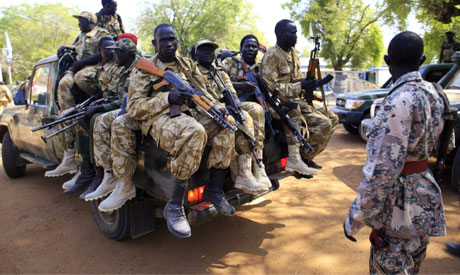
South Sudan army soldiers hold their weapons as they ride on a truck in Bor, 180 km (108 miles) northwest from capital Juba December 25, 2013 (Photo: Reuters)
Government forces and rebels in South Sudan were battling for control Friday of a key oil town as regional powers met in an effort to broker an end to the worsening civil war.
Witnesses reported heavy fighting overnight in Malakal, capital of the oil-producing Upper Nile State, and both government forces allied to President Salva Kiir and rebels loyal to ex-vice president Riek Machar insisted they were in control after days of street battles.
In the Kenyan capital Nairobi, regional leaders gathered for a fresh attempt to draw up a peace plan that could broker an end to the nearly two weeks of fighting, which has left thousands dead and tens of thousands of others seeking protection with the UN amid a wave of ethnic violence.
The United Nations meanwhile announced extra troops and "critical assets" like helicopters would be on the ground by Saturday. UN officials have admitted to being badly overstretched and unable to cope with the dual role of protecting as well as feeding and sheltering terrified civilians.
A rebel spokesman in Unity State, Moses Ruai Lat, said "the whole of Malakal" was now in the hands of Machar's loyalists, who already control Bentiu, capital of the neighbouring oil-producing Unity State.
"All those forces who are loyal to the president have been cleared and the former governor of Upper Nile, Simon Kun Poch, is on the run," he told AFP.
But South Sudanese Defence Minister Kuol Manyang Juuk dismissed the claim was "disinformation".
"The elements loyal to Riek Machar were defeated and they are no longer in Malakal. The town is under full government control," he said, adding that government troops -- the Sudan People's Liberation Army (SPLA) -- were reinforcing their presence in the town.
On Thursday South Sudan's army spokesman Philip Aguer said the town was divided into two, with the rebels controlling the southern part and SPLA controlling the north. Witnesses and independent sources reported fierce overnight street fighting, suggesting the situation on the ground was far less clear.
The fighting in South Sudan started on December 15 after Kiir accused Machar, whom he sacked in July, of attempting a coup. Machar denied this, and said the president was exploiting a clash between members of the army as a pretext to carry out a purge.
Fighting has since spread to half of South Sudan's 10 states, with the violence taking on an ethnic dimension -- pitting members of Kiir's Dinka tribe against Machar's Nuer community and atrocities reported to have been carried out by both sides.
Witnesses have reported massacres, summary executions and rapes, and UN Secretary General Ban Ki-moon has promised those responsible would be "held accountable".
On Thursday Kenyan President Uhuru Kenyatta and Ethiopian Prime Minister Hailemariam Desalegn, who have been trying to broker peace, claimed "good progress" after a meeting with President Kiir in Juba.
East African leaders from the Inter-Governmental Authority on Development(IGAD) were meeting in Nairobi on Friday with the aim of patching together a peace plan, officials said.
China meanwhile said it would soon dispatch its special envoy for African affairs to South Sudan to make contact with all sides and help the situation quickly return to stability.
China is the main buyer of South Sudan's oil, and has invested heavily in oil infrastructure and pipelines that carry crude from Unity and Upper Nile States.
Crude prices have edged higher because of the fighting as oil production, which accounts for more than 95 percent of South Sudan's economy, was dented by the violence and oil workers evacuated.
The UN says more that 120,000 people have been displaced, including 63,000 sheltering in UN peacekeeping bases. UN special envoy Hilde Johnson has said UN troops were "overstretched" and needed extra manpower to be deployed with "unprecedented speed".
"We are working on 48 hours delivery of several of the critical assets that we need," she said.
The UN Security Council agreed Tuesday to nearly double the size of its mission known as UNMISS, allowing for up to 12,500 soldiers and 1,300 police, after the violence raged out of control.
Johnson said the UN peacekeeping office was "working around the clock" to get assets for its South Sudan mission from other deployments in Africa, notably in the Democratic Republic of Congo, Sudan's Darfur region and Liberia.
Short link: